- Home
- Ken Follett
Triple Page 5
Triple Read online
Page 5
In the faint, shifting light, Borg looked like the giant in a fairy story. He had heavy features: thick lips, broad cheeks, and protruding eyes shadowed by thick brows. As a child he had been told he was ugly, and so he had grown into an ugly man. When he was uneasy--like now--his hands went continually to his face, covering his mouth, rubbing his nose, scratching his forehead, in a subconscious attempt to hide his unsightliness. Once, in a relaxed moment, Dickstein had asked him, "Why do you yell at everybody?" and he had replied, "Because they're all so fucking handsome."
They never knew what language to use when they spoke. Borg was French-Canadian originally, and found Hebrew a struggle. Dickstein's Hebrew was good and his French only passable. Usually they settled for English.
Dickstein had worked under Borg for ten years, and still he did not like the man. He felt he understood Borg's troubled, unhappy nature; and he respected his professionalism and his obsessional devotion to Israeli Intelligence; but in Dickstein's book this was not enough cause to like a person. When Borg lied to him, there were always good sound reasons, but Dickstein resented the lie no less.
He retaliated by playing Borg's tactics back against him. He would refuse to say where he was going, or he would lie about it. He never checked in on schedule while he was in the field: he simply called or sent messages with peremptory demands. And he would sometimes conceal from Borg part or all of his game plan. This prevented Borg from interfering with schemes of his own, and it was almost more secure--for what Borg knew, he might be obliged to tell the politicians, and what they knew might find its way to the opposition. Dickstein knew the strength of his position--he was responsible for many of the triumphs which had distinguished Borg's career--and he played it for all it was worth.
The Citroen roared through the Arab town of Nazareth--deserted now, presumably under curfew--and went on into the night, heading for Tel Aviv. Borg lit a thin cigar and began to speak.
"After the Six-Day War, one of the bright boys in the Ministry of Defense wrote a paper entitled 'The Inevitable Destruction of Israel.' The argument went like this. During the War of Independence, we bought arms from Czechoslovakia. When the Soviet bloc began to take the Arab side, we turned to France, and later West Germany. Germany called off all deals as soon as the Arabs found out. France imposed an embargo after the Six-Day War. Both Britain and the United States have consistently refused to supply us with arms. We are losing our sources one by one.
"Suppose we are able to make up those losses, by continually finding new suppliers and by building our own munitions industry: even then, the fact remains that Israel must be the loser in a Middle East arms race. The oil countries will be richer than us throughout the foreseeable future. Our defense budget is already a terrible burden on the national economy whereas our enemies have nothing better to spend their billions on. When they have ten thousand tanks, we'll need six thousand; when they have twenty thousand tanks, we'll need twelve thousand; and so on. Simply by doubling their arms expenditure every year, they will be able to cripple our national economy without firing a shot.
"Finally, the recent history of the Middle East shows a pattern of limited wars about once a decade. The logic of this pattern is against us. The Arabs can afford to lose a war from time to time. We can't: our first defeat will be our last war.
"Conclusion: the survival of Israel depends on our breaking out of the vicious spiral our enemies have prescribed for us."
Dickstein nodded. "It's not a novel line of thought. It's the usual argument for 'peace at any price.' I should think the bright boy got fired from the Ministry of Defense for that paper."
"Wrong both times. He went on to say, 'We must inflict, or have the power to inflict, permanent and crippling damage to the next Arab army that crosses our borders. We must have nuclear weapons.' "
Dickstein was very still for a moment; then he let out his breath in a long whistle. It was one of those devastating ideas that seems completely obvious as soon as it has been said. It would change everything. He was silent for a while, digesting the implications. His mind teemed with questions. Was it technically feasible? Would the Americans help? Would the Israeli Cabinet approve it? Would the Arabs retaliate with their own bomb? What he said was, "Bright boy in the Ministry, hell. That was Moshe Dayan's paper."
"No comment," said Borg.
"Did the Cabinet adopt it?"
"There has been a long debate. Certain elder statesmen argued that they had not come this far to see the Middle East wiped out in a nuclear holocaust. But the opposition faction relied mainly on the argument that if we have a bomb, the Arabs will get one too, and we will be back at square one. As it turned out, that was their big mistake." Borg reached into his pocket and took out a small plastic box. He handed it to Dickstein.
Dickstein switched on the interior light and examined the box. It was about an inch and a half square, thin, and blue in color. It opened to reveal a small envelope made of heavy light-proof paper. "What's this?" he said.
Borg said, "A physicist named Friedrich Schulz visited Cairo in February. He is Austrian but he works in the United States. He was apparently on holiday in Europe, but his plane ticket to Egypt was paid for by the Egyptian government.
"I had him followed, but he gave our boy the slip and disappeared into the Western Desert for forty-eight hours. We know from CIA satellite pictures that there is a major construction project going on in that part of the desert. When Schulz came back, he had that in his pocket. It's a personnel dosimeter. The envelope, which is light-tight, contains a piece of ordinary photographic film. You carry the box in your pocket, or pinned to your lapel or trouser belt. If you're exposed to radiation, the film will show fogging when it's developed. Dosimeters are carried, as a matter of routine, by everyone who visits or works in a nuclear power station."
Dickstein switched off the light and gave the box back to Borg. "You're telling me the Arabs are already making atom bombs," he said softly.
"That's right." Borg spoke unnecessarily loudly.
"So the Cabinet gave Dayan the go-ahead to make a bomb of his own."
"In principle, yes."
"How so?"
"There are some practical difficulties. The mechanics of the business are simple--the actual clockwork of the bomb, so to speak. Anyone who can make a conventional bomb can make a nuclear bomb. The problem is getting hold of the explosive material, plutonium. You get plutonium out of an atomic reactor. It's a by-product. Now, we have a reactor, at Dimona in the Negev Desert. Did you know that?"
"Yes."
"It's our worst-kept secret. However, we don't have the equipment for extracting the plutonium from the spent fuel. We could build a reprocessing plant, but the problem is that we have no uranium of our own to put through the reactor."
"Wait a minute." Dickstein frowned. "We must have uranium, to fuel the reactor for normal use."
"Correct. We get it from France, and it's supplied to us on condition we return the spent fuel to them for reprocessing, so they get the plutonium."
"Other suppliers?"
"Would impose the same condition--it's part of all the nuclear non-proliferation treaties."
Dickstein said, "But the people at Dimona could siphon off some of the spent fuel without anyone noticing."
"No. Given the quantity of uranium originally supplied, it's possible to calculate precisely how much plutonium comes out the other end. And they weigh it very carefully--it's expensive stuff."
"So the problem is to get hold of some uranium."
"Right."
"And the solution?"
"The solution is, you're going to steal it."
Dickstein looked out of the window. The moon came out, revealing a flock of sheep huddled in a corner of a field, watched by an Arab shepherd with a staff: a Biblical scene. So this was the game: stolen uranium for the land of milk and honey. Last time it had been the murder of a terrorist leader in Damascus; the time before, blackmailing a wealthy Arab in Monte Carlo to stop him f
unding the Fedayeen.
Dickstein's feelings had been pushed into the background while Borg talked about politics and Schulz and nuclear reactors. Now he was reminded that this involved him; and the fear came back, and with it a memory. After his father died the family had been desperately poor, and when creditors called, Nat had been sent to the door to say mummy was out. At the age of thirteen, he had found it unbearably humiliating, because the creditors knew he was lying, and he knew they knew, and they would look at him with a mixture of contempt and pity which pierced him to the quick. He would never forget that feeling--and it came back, like a reminder from his unconscious, when somebody like Borg said something like, "Little Nathaniel, go steal some uranium for your motherland."
To his mother he had always said, "Do I have to?" And now he said to Pierre Borg, "If we're going to steal it anyway, why not buy it and simply refuse to send it back for reprocessing?"
"Because that way, everyone would know what we're up to."
"So?"
"Reprocessing takes time--many months. During that time two things could happen: one, the Egyptians would hurry their program; and two, the Americans would pressure us not to build the bomb."
"Oh!" It was worse. "So you want me to steal this stuff without anyone knowing that it's us."
"More than that." Borg's voice was harsh and throaty. "Nobody must even know it's been stolen. It must look as if the stuff has just been lost. I want the owners, and the international agencies, to be so embarrassed about the stuff disappearing that they will hush it up. Then, when they discover they've been robbed, they will be compromised by their own cover-up."
"It's bound to come out eventually."
"Not before we've got our bomb."
They had reached the coast road from Haifa to Tel Aviv, and as the car butted through the night Dickstein could see, over to the right, occasional glimpses of the Mediterranean, glinting like jewelry in the moonlight. When he spoke he was surprised at the note of weary resignation in his voice. "How much uranium do we need?"
"They want twelve bombs. In the yellowcake form--that's the uranium ore--it would mean about a hundred tons."
"I won't be able to slip it into my pocket, then." Dickstein frowned. "What would all that cost if we bought it?"
"Something over one million U.S. dollars."
"And you think the losers will just hush it up?"
"If it's done right."
"How?"
"That's your job, Pirate."
"I'm not so sure it's possible," Dickstein said.
"It's got to be. I told the Prime Minister we could pull it off. I laid my career on the line, Nat."
"Don't talk to me about your bleeding career."
Borg lit another cigar--a nervous reaction to Dickstein's scorn. Dickstein opened his window an inch to let the smoke out. His sudden hostility had nothing to do with Borg's clumsy personal appeal: that was typical of the man's inability to understand how people felt toward him. What had unnerved Dickstein was a sudden vision of mushroom clouds over Jerusalem and Cairo, of cotton fields by the Nile and vineyards beside the Sea of Galilee blighted by fallout, the Middle East wasted by fire, its children deformed for generations.
He said, "I still think peace is an alternative."
Borg shrugged. "I wouldn't know. I don't get involved in politics."
"Bullshit."
Borg sighed. "Look, if they have a bomb, we have to have one too, don't we?"
"If that was all there was to it, we could just hold a press conference, announce that the Egyptians are making a bomb, and let the rest of the world stop them. I think our people want the bomb anyway. I think they're glad of the excuse."
"And maybe they're right!" Borg said. "We can't go on fighting a war every few years--one of these days we might lose one."
"We could make peace."
Borg snorted. "You're so fucking naive."
"If we gave way on a few things--the Occupied Territories, the Law of Return, equal rights for Arabs in Israel--"
"The Arabs have equal rights."
Dickstein smiled mirthlessly. "You're so fucking naive."
"Listen!" Borg made an effort at self-control. Dickstein understood his anger: it was a reaction he had in common with many Israelis. They thought that if these liberal ideas should ever take hold, they would be the thin edge of the wedge, and concession would follow concession until the land was handed back to the Arabs on a plate--and that prospect struck at the very roots of their identity. "Listen," Borg said again. "Maybe we should sell our birthright for a mess of potage. But this is the real world, and the people of this country won't vote for peace-at-any-price; and in your heart you know that the Arabs aren't in any great hurry for peace either. So, in the real world, we still have to fight them; and if we're going to fight them we'd better win; and if we're to be sure of winning, you'd better steal us some uranium."
Dickstein said, "The thing I dislike most about you is, you're usually right."
Borg wound down his window and threw away the stub of his cigar. It made a trail of sparks on the road, like a firecracker. The lights of Tel Aviv became visible ahead: they were almost there.
Borg said, "You know, with most of my people I don't feel obliged to argue politics every time I give them an assignment. They just take orders, like operatives are supposed to."
"I don't believe you," Dickstein said. "This is a nation of idealists, or it's nothing."
"Maybe."
"I once knew a man called Wolfgang. He used to say, 'I just take orders.' Then he used to break my leg."
"Yeah," Borg said. "You told me."
When a company hires an accountant to keep the books, the first thing he does is announce that he has so much work to do on the overall direction of the company's financial policy that he needs to hire a junior accountant to keep the books. Something similar happens with spies. A country sets up an intelligence service to find out how many tanks its neighbor has and where they are kept, and before you can say MI5 the intelligence service announces that it is so busy spying on subversive elements at home that a separate service is needed to deal with military intelligence.
So it was in Egypt in 1955. The country's fledgling intelligence service was divided into two directorates. Military Intelligence had the job of counting Israel's tanks; General Investigations had all the glamor.
The man in charge of both these directorates was called the Director of General Intelligence, just to be confusing; and he was supposed--in theory--to report to the Minister of the Interior. But another thing that always happens to spy departments is that the Head of State tries to take them over. There are two reasons for this. One is that the spies are continually hatching lunatic schemes of murder, blackmail and invasion which can be terribly embarrassing if they ever get off the ground, so Presidents and Prime Ministers like to keep a personal eye on such departments. The other reason is that intelligence services are a source of power, especially in unstable countries, and the Head of State wants that power for himself.
So the Director of General Intelligence in Cairo always, in practice, reported either to the President or to the Minister of State at the Presidency.
Kawash, the tall Arab who interrogated and killed Towfik and subsequently gave the personnel dosimeter to Pierre Borg, worked in the Directorate of General Investigations, the glamorous civilian half of the service. He was an intelligent and dignified man of great integrity, but he was also deeply religious--to the point of mysticism. His was the solid, powerful kind of mysticism which could support the most unlikely--not to say bizarre--beliefs about the real world. He adhered to a brand of Christianity which held that the return of the Jews to the Promised Land was ordained in the Bible, and was a portent of the end of the world. To work against the return was therefore a sin; to work for it, a holy task. This was why Kawash was a double agent.
The work was all he had. His faith had led him into the secret life, and there he had gradually cut himself off from friends, neigh
bors, and--with exceptions--family. He had no personal ambitions except to go to heaven. He lived ascetically, his only earthly pleasure being to score points in the espionage game. He was a lot like Pierre Borg, with this difference: Kawash was happy.
At present, though, he was troubled. So far he was losing points in the affair which had begun with Professor Schulz, and this depressed him. The problem was that the Qattara project was being run not by General Investigations but by the other half of the intelligence effort--Military Intelligence. However, Kawash had fasted and meditated, and in the long watches of the night he had developed a scheme for penetrating the secret project.
He had a second cousin, Assam, who worked in the office of the Director of General Intelligence--the body which coordinated Military Intelligence and General Investigations. Assam was more senior than Kawash, but Kawash was smarter.
The two cousins sat in the back room of a small, dirty coffee house near the Sherif Pasha in the heat of the day, drinking lukewarm lime cordial and blowing tobacco smoke at the flies. They looked alike in their lightweight suits and Nasser mustaches. Kawash wanted to use Assam to find out about Qattara. He had devised a plausible line of approach which he thought Assam would go for, but he knew he had to put the matter very delicately in order to win Assam's support. He appeared his usual imperturbable self, despite the anxiety he felt inside.
He began by seeming to be very direct. "My cousin, do you know what is happening at Qattara?"
A rather furtive look came over Assam's handsome face. "If you don't know, I can't tell you."

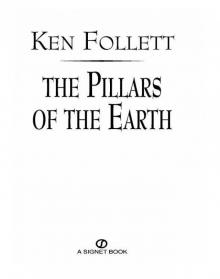 The Pillars of the Earth
The Pillars of the Earth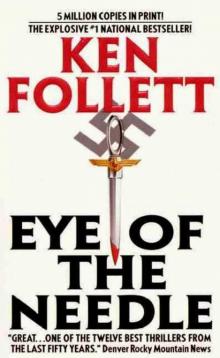 Eye Of The Needle
Eye Of The Needle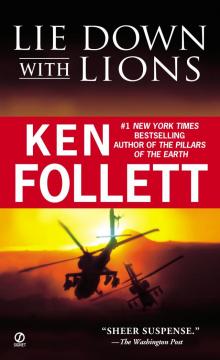 Lie Down With Lions
Lie Down With Lions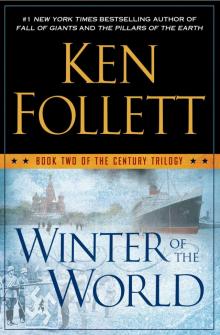 Winter of the World
Winter of the World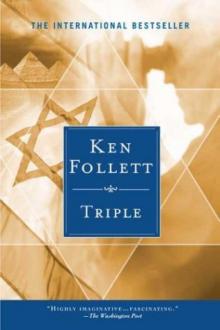 Triple
Triple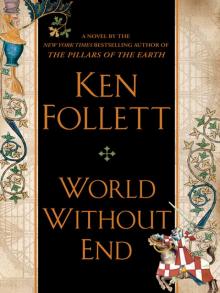 World Without End
World Without End Fall of Giants
Fall of Giants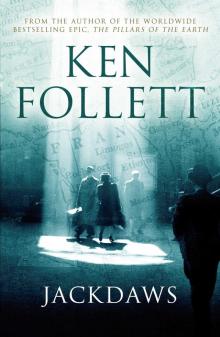 Jackdaws
Jackdaws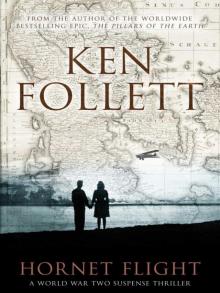 Hornet Flight
Hornet Flight Whiteout
Whiteout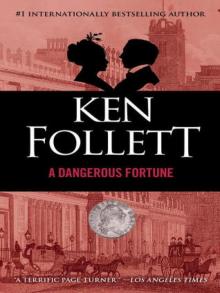 A Dangerous Fortune
A Dangerous Fortune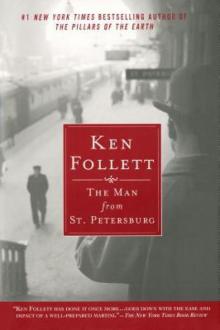 The Man From St. Petersburg
The Man From St. Petersburg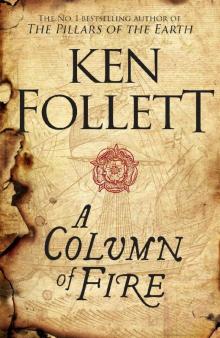 A Column of Fire
A Column of Fire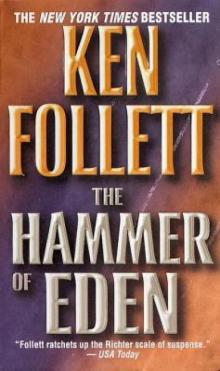 The Hammer of Eden
The Hammer of Eden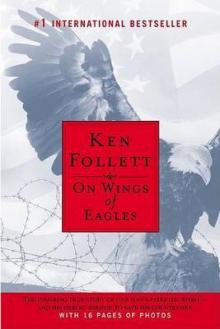 On Wings of Eagles
On Wings of Eagles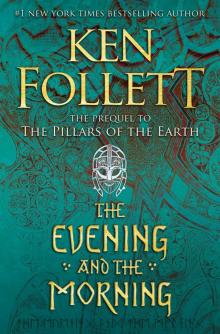 The Evening and the Morning
The Evening and the Morning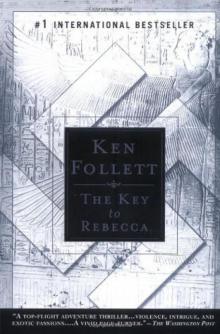 The Key to Rebecca
The Key to Rebecca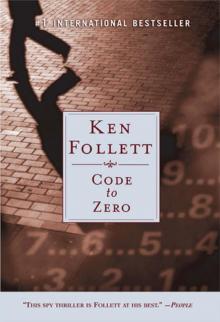 Code to Zero
Code to Zero Paper Money
Paper Money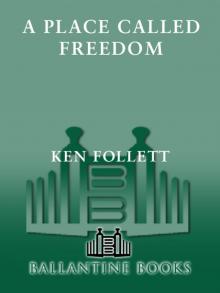 A Place Called Freedom
A Place Called Freedom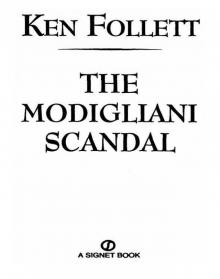 The Modigliani Scandal
The Modigliani Scandal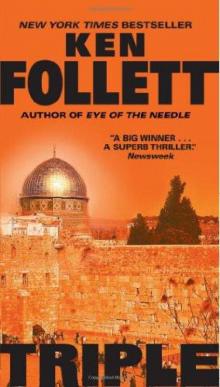 Triple (1991)
Triple (1991)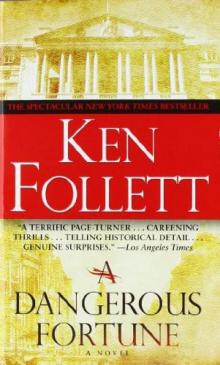 A Dangerous Fortune (1994)
A Dangerous Fortune (1994)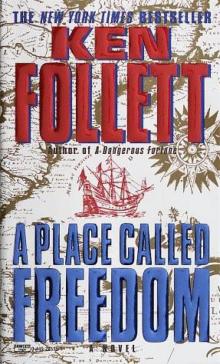 A Place Called Freedom (1995)
A Place Called Freedom (1995)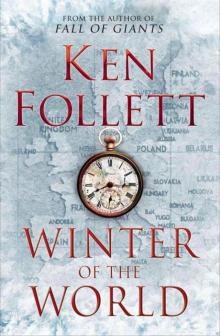 Winter of the World (Century Trilogy 2)
Winter of the World (Century Trilogy 2)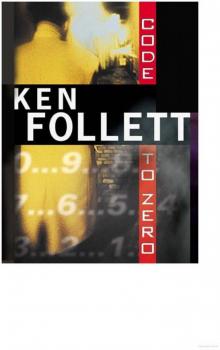 Code to Zero (2000)
Code to Zero (2000)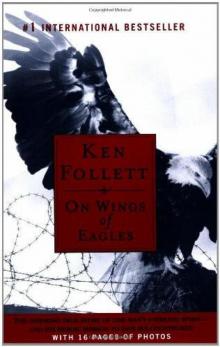 On Wings Of Eagles (1990)
On Wings Of Eagles (1990)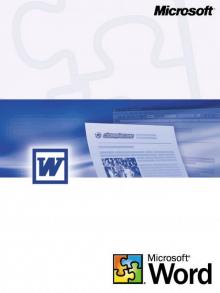 Storm Island
Storm Island Fall of Giants (The Century Trilogy)
Fall of Giants (The Century Trilogy)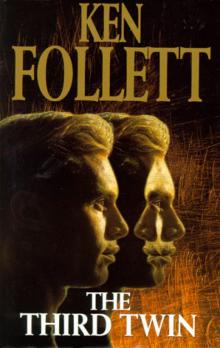 the Third Twin (1996)
the Third Twin (1996)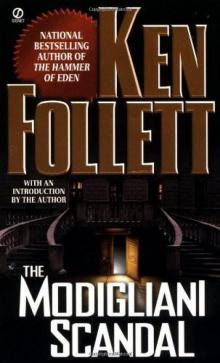 The Modigliani Scandal (1976)
The Modigliani Scandal (1976)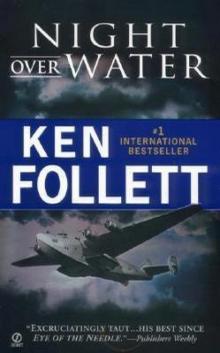 Night Over Water
Night Over Water